“I’m most proud of how this program is truly impacting the diversity of academia by including individuals from backgrounds historically underrepresented in STEM and the biomedical research workforce,” says JoAnn Trejo, Ph.D., professor at University of California San Diego (UCSD) and director of San Diego’s Institutional Research and Academic Career Development Award (IRACDA). The program, now in its 20th year of NIGMS funding, aims to train a diverse group of postdoctoral fellows (postdocs) for both the teaching and independent research aspects of a career as a professor in the biomedical sciences.
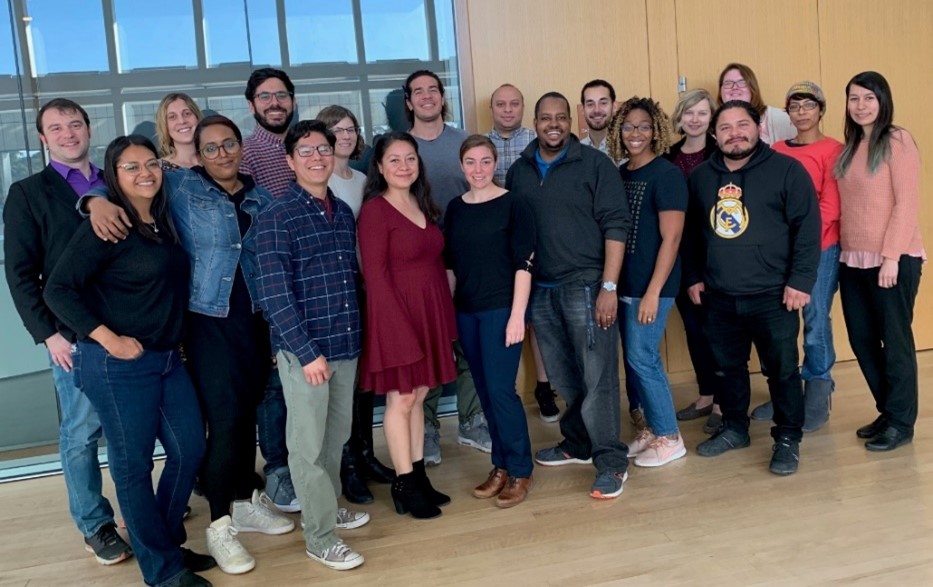
The San Diego IRACDA focuses on preparing its fellows for tenure-track positions at different types of institutions, including research-intensive universities. Fellows typically go through a 3-year program where they work in a research lab at UCSD, teach at one of the two “partner” schools (both of which are minority-serving institutions), and take career development courses in skillsets like effectively mentoring, running a cutting-edge research lab, and innovatively redesigning undergraduate science courses. Fellows also mentor students at the partner schools, helping them prepare graduate school applications, putting them through mock interviews, educating them in research, and teaching them how to read and understand scientific literature.
Training the Next Generation of Leaders
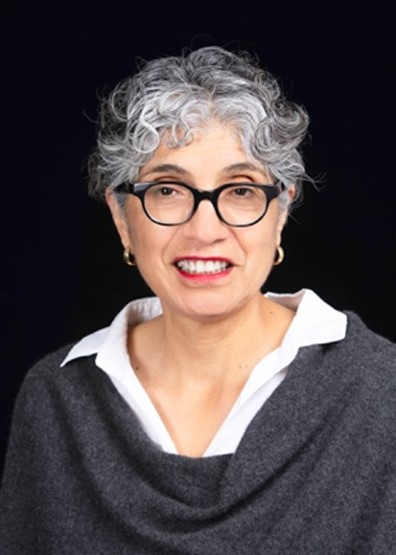
Born in California to a family of Mexican migrant farm workers, Dr. Trejo has first-hand experience with the challenges the fellows coming through the San Diego IRACDA program have faced. She remembers feeling “a bit unwelcomed” in research environments during graduate school, being one of only two students from racially diverse backgrounds. When she arrived at UCSD in 2008, she immediately got involved with the IRACDA program and later became its director in 2012. She claims, “It’s been one of the most gratifying experiences I’ve had as an academic.” She often sees fellows start in the program, especially women and individuals from underrepresented backgrounds, who have significant doubt that they can achieve their goals despite their passion for becoming a professor. “Time and time again, I’ve seen them succeed and go on to be outstanding academics,” she says. “This program is training the next generation of faculty leaders who will not only be great researchers and teachers but will also be the leaders and stewards enhancing diversity, equity, and inclusivity—which is what we really need.”
People Who “Look Like You”
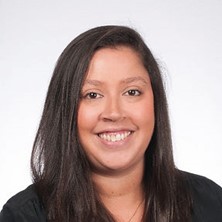
“Through IRACDA, you realize there are people out there who actually look like you and care about both teaching and research—which unfortunately is hard to find,” says Laura Sanchez, Ph.D., associate professor at University of California, Santa Cruz. She praises the IRACDA program for providing a community during her postdoctoral training, a time that can often be very isolating. As she recalls attending the national meeting for IRACDA fellows, she says, “For the first time I thought, ‘There are a lot of Black and Brown people here,’ which is pretty rare at large scientific conferences.”
Toward the end of her fellowship, Dr. Sanchez applied for teaching positions at small, undergraduate schools that didn’t have much research, and when she was offered a job at one of them, an advisor urged her to take it. She hesitated, though, because she realized she wouldn’t be able to do the type of research she dreamed of doing. She sought advice from Dr. Trejo, who encouraged her to stay in the program another year before applying to larger, research-intensive institutions. “Having someone tell me ‘you can do this’ was really nice,” she says. “Lots of times faculty want to place people in jobs without taking the time to figure out if it’s the right job. But Dr. Trejo really took into account what we wanted out of a career and helped us get there.”
Finding Your Passion
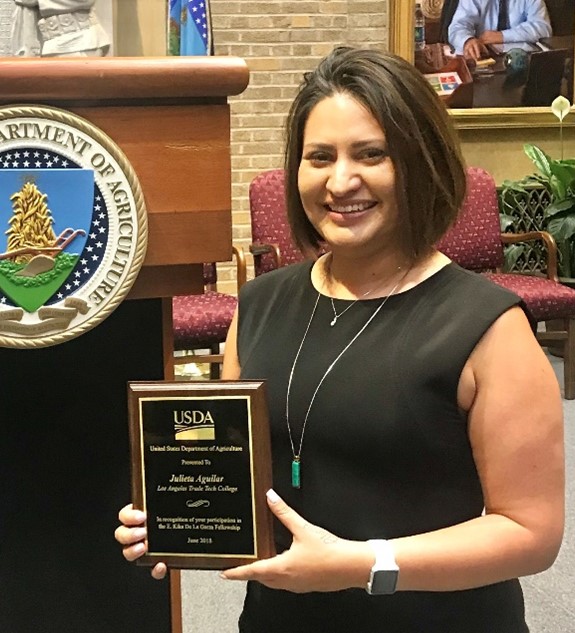
Julieta Aguilar, Ph.D., associate professor and chair of biology at Los Angeles Trade Technical College, California, was born in Mexico and moved to Los Angeles as a child. She was the first person in her family to attend college and remembers feeling lost when she first started community college. “I didn’t know what education was or what path to take. I was a single, teenage mom, figuring out school and motherhood at the same time.” She credits great community college instructors and programs that guided her, and she eventually transferred schools to earn her bachelor’s degree.
After earning her Ph.D., she started a postdoc at UCSD, where she joined the IRACDA program. She originally planned on becoming a faculty member at a research-intensive university, but her experience with the program helped her find a different path. “Through IRACDA, I started teaching at the community college partner school, and I just knew that’s where I belonged,” she says. “My passion is in teaching and mentoring students underrepresented in science and from economically disadvantaged backgrounds. I felt like community college was the place that I could best serve in that role.”
Even though she didn’t follow her original plan, she believes the IRACDA program helped prepare her to be successful in her current position. “The community college where I now teach predominantly serves Latinos, and most students in my program are women,” she says. “IRACDA gave me the tools to be an effective mentor to my students. I get to share my experiences and educational journey—the struggles, challenges, and how I overcame them. I’m lucky to be in the position where I get to interact with and be a role model for these students. Without IRACDA, I don’t think I would have found the path that I did.”
From Mentee to Mentor
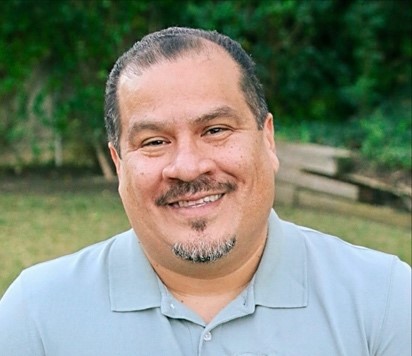
David J. Gonzalez, Ph.D., associate professor at UCSD, describes his journey to professorship as “a road less taken.” As a first-generation Mexican American, he came from a home that emphasized earning a living over education, and he dropped out of high school to join the family landscaping business. He recalls an epiphany he had as a 20-year-old, cutting grass across from a community college while his wife was about to have their first child: “I saw students my age carrying backpacks, and I envisioned myself carrying a baby instead. I decided I wanted to break my family’s cycle of being laborers.” With only an 8th-grade education, he enrolled in community college and began an 8-year journey to complete his bachelor’s degree where he says he caught the academic bug. During that time, he sought out a research position at UCSD, supported by the Research Training Initiative for Student Enhancement (RISE) program, and he eventually pursued his Ph.D. and later his postdoctoral training there at UCSD.
As a postdoc, he was supported by several fellowships and awards, but he credits the training he received as an IRACDA fellow as being “a game changer” for his career. He says, “Coming from my landscaping job, I had the work ethic. I knew I had the science and the passion for research, but I still needed to learn professionalism and how to be a professor.” He credits Dr. Trejo’s leadership with providing him that training and equipping him for his current position as a faculty member: “Training under a faculty member of color was extremely valuable to me. It solidified my decision to be a professor and gave me the courage to believe that I could do it.” In addition to professional development training, Dr. Gonzalez also acknowledges the IRACDA program for sponsoring his training in tools and techniques that are now central to not only his lab’s success, but also to the success of other research being done across UCSD.
“As a Hispanic scientist, I have first-hand understanding of the struggles faced by many underrepresented minority students in the biomedical sciences,” says Dr. Gonzalez. He had a family to support throughout his education and the financial struggles that went along with that, but his biggest hurdles were mental ones. “I, like many first-generation and students of color, faced imposter syndrome.” Even years into his professorship, he had thoughts like, “I don’t belong here” or “I’m not good enough to be here.”
Another mental hurdle was the isolation he felt as a minority student, which he combatted by seeking out programs like RISE and IRACDA that promoted science, professional development, and diversity. “Now, as an associate professor of color, I feel a duty to mentor and inspire other underrepresented minorities and promote diversity, equity, and inclusion within the biomedical sciences,” he says. He currently mentors an IRACDA fellow, and more than half of the trainees in his lab are underrepresented minorities: “It’s no accident that students of color are attracted to my lab—they know my story and hope that I’ll be a little more understanding of their culture and their backgrounds.” To encourage diversity, he also served on the admissions committee for the graduate program, which achieved a threefold increase in admission of underrepresented minority students during his time in that position. Dr. Gonzalez is not only promoting diversity and inspiring his students to become scientists, but his two sons are also continuing in his footsteps: One is in a biomedical sciences Ph.D. program, and the other is applying to medical school.
The San Diego IRACDA program is supported by NIGMS grant K12GM068524.


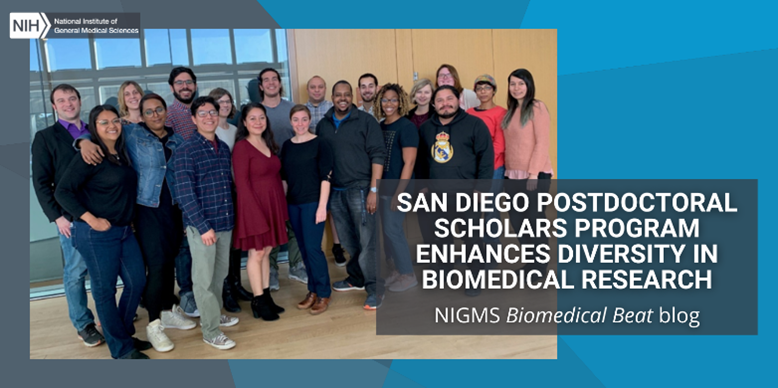
Thanks for this beautiful and highly informative messages.
However, I hope the underrepresented referred to in this text is not limited as I would wish to see applicants from Africa enjoying similar privileges as those cited above. I don’t know which region of the world can be worse in terms of scientific development than Africa.
I really appreciate the extensive training provided under this Is there a similar program for international researchers?
Thanks for your interest in this post and NIGMS funding opportunities. Per NIH policy, eligibility for K12 programs such as IRACDA are limited to U.S. citizens, non-citizen nationals, or people lawfully admitted for permanent residence.